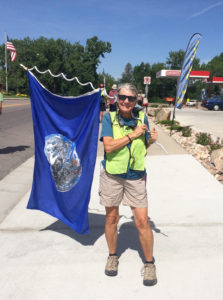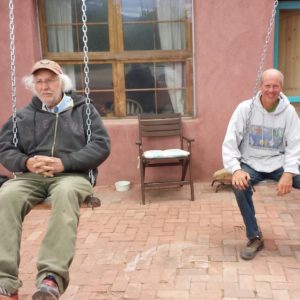Dear Friends,
This is the final week of Climate March’s screening of the award-winning film, The Race to Save the World. Click here to buy a ticket, which also gives you access to the panel discussion this coming Saturday at 7:00 p.m. Central Time. The film’s message is urgent, and I think you’ll find it provocative and inspiring.
I’m excited about the panel, too, which features:

Miriam Kashia is featured in The Race to Save the World. This photo is of Miriam during the 2014 Great March for Climate Action.
— Miriam Kashia of Iowa City, who at the age of 71 walked every step of the Great March for Climate Action 2014.
— Pascha Morgan, who walked 1200 miles from Iowa to Texas two years ago to call attention to the struggles of immigrant families seeking asylum.
— Hannah Bacon, who is currently walking coast-to-coast for climate action to raise money for the Sunrise Movement.
As I watched the film’s footage of some of my fellow marchers struggling during long days across the western desert, I thought of our trek through New Mexico. Seven years ago today, I had the privilege of meeting Danny Lyon. Here’s an excerpt about that encounter from my book, Marcher, Walker, Pilgrim:
A radio station interviews me and I announce that our motley collective of minstrels — the Climate Justice Gypsy Band — will perform tonight at a local cafe. We hope for a decent crowd and maybe a hundred bucks in the tip jar.

Danny Lyon and Ed Fallon
I arrive late. The band is on its second set when I grab my guitar and join in. Marchers are having a great time, despite the sad reality that our audience consists of one guy. He’s an older man with large tufts of white hair sticking out of a well-worn baseball cap. He seems sad, or at least serious, maybe even a bit grumpy. He wears a faded black sweatshirt reading “Queens.” That and his New York accent suggest he’s not native to New Mexico.
Our tip jar is empty. The guy notices and drops a $100 bill into it. As the evening wears on and our band continues to play to a mostly empty house, the man drops in another $100 bill, then three more until the jar contains $500!
I introduce myself during a break. The man’s name is Danny Lyon. He heard my interview on the radio earlier today and wanted to meet us. I thank him profusely for his generosity. He gives me his card and invites me to visit his home tomorrow (our day off from marching), about 20 miles away.
I do a little research and learn that Danny’s a distinguished photographer, journalist, and film maker with award-winning work dating back to the 1960s civil rights struggle. He picks me up at camp in a battered old Volvo and we drive to the adobe house where he and his wife, Nancy, have lived for 38 years. “Most of this house was built by a single illegal Mexican worker named Eddie,” Danny says proudly. “And I like that it’s biodegradable. Someday, it’ll just be a big heap of mud.”
The home is modest. A large room serves as Danny’s work studio. The walls are papered with his photographs. I admire the iconic images of the civil rights struggle, men on motorcycles, and the decay and demolition of Brooklyn, where Danny grew up. The photos span fifty years of struggle by average American men and women — sometimes fighting personal demons but more often the demons of institutional injustice, racism, and environmental destruction.
Danny’s working on a book about climate change (Burn Zone). He sees how it’s affecting New Mexico through less snow-pack, windier conditions, and bigger and more frequent wildfires. “What you guys are doing is inspiring,” he tells me. “It’s important. Maybe that’s hard to see when you’re in the middle of it, but it’s important.”
I note the consistently serious nature of his work and the strong social commentary. I ask about the political statements he’s trying to make. “This is powerful material,” I observe. “You focus on stuff that’s controversial, edgy. Have you had much pushback over the years?”
Danny ignores my question. “I don’t see my work as political. If you become overtly political, you destroy the art in the artwork. And this whole notion of objective journalism — that’s bullshit. You can’t stand in front of a burning hospital that’s just been bombed and not have an opinion. You’re not a reporter. You’re a person.”
After talking for an hour over tea, we adjourn to two swings in front of the house where I again thank Danny for filling up our tip jar last night.
Again, seven years later, thank you Danny Lyon! And yes, what we’re doing — all of us who are working for climate action — is important. So please, check out The Race to Save the World. And check out this week’s Fallon Forum podcast (details below). Thanks! — Ed Fallon
*******
(01:29) So what if the climate is always changing, with Charles Goldman
(13:46) Life in the GOP post-Trump, with Charles Goldman
(26:20) Red-state Iowa lands a big — ouch — story in the NY Times, with Charles Goldman
(39:10) The confluence of clothing and climate = slow fashion, with Anesa Kajtazovic
(51:25) Monitoring our worsening drought, with Kathy Byrnes
Watch the conversation with Kathy Byrnes on our YouTube channel.
Please support the local businesses and non-profits who make this program possible. Click on their logos elsewhere and visit Story County Veterinary Clinic, Bold Iowa, and Birds & Bees Urban Farm.
Subscribe to the Fallon Forum on Stitcher, Apple Podcasts, or your preferred podcast platform. Check out our website and Facebook Page, and listen to the program on these and other local affiliates:
– KHOI 89.1 FM (Ames, Iowa)
– KICI.LP 105.3 FM (Iowa City, Iowa)
– WHIV 102.3 FM (New Orleans, Louisiana)
– KPIP-LP, 94.7 FM (Fayette, Missouri)
– KCEI 90.1 FM (Taos, New Mexico)
– KRFP 90.3 FM (Moscow, Idaho)
Thanks for supporting the progressive alternative to right-wing shock jocks!

Ed Fallon
